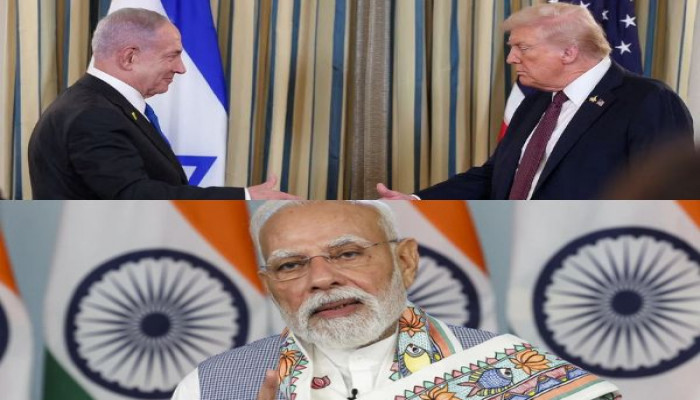Trump pushes Gaza peace deal with Netanyahu’s support, PM Modi welcomes the proposal
- In Reports
- 07:20 PM, Sep 30, 2025
- Myind Staff
US President Donald Trump on Monday rolled out a sweeping 20-point plan to bring an end to the devastating war in Gaza, securing the support of Israeli Prime Minister Benjamin Netanyahu but leaving open the question of whether Hamas will come on board.
At a White House press conference with Netanyahu, Trump said they were “beyond very close” to achieving peace, but he warned Hamas that Israel would have America’s full backing to act as it saw fit if the group rejected the deal.
The plan calls for an immediate ceasefire, the return of Israeli hostages in exchange for Palestinian prisoners, a phased pullback of Israeli troops, the disarmament of Hamas, and a temporary administration for Gaza overseen by an international body. Day-to-day governance would be handled by a technocratic Palestinian committee, supervised by a “Board of Peace” led by Trump and including former British Prime Minister Tony Blair.
Netanyahu backed the plan, saying it matched Israel’s objectives. Standing beside Trump, he said, “I support your plan to end the war in Gaza, which achieves our war aims. It will bring back to Israel all our hostages, dismantle Hamas’ military capabilities, end its political rule, and ensure that Gaza never again poses a threat to Israel.”
The plan’s future now rests on Hamas, which triggered the war with its attack on Israel on October 7, 2023. According to Israeli estimates, the group still holds 48 hostages, including 20 who are alive. A Hamas official told Reuters, “Hamas hasn’t yet received the plan officially, nothing beyond media publication.” Mediators in Qatar and Egypt later shared the proposal with the group, which promised to study it “in good faith.”
Under the plan, all hostages would be released within 72 hours of a ceasefire, and Israel would free over 1,900 Palestinian prisoners. Hamas members who renounce violence and surrender weapons would receive amnesty or safe passage out of Gaza. Humanitarian aid would be allowed in freely, and reconstruction would begin under an international programme, including a special economic zone to revive Gaza’s shattered economy.
The proposal leaves the question of Palestinian statehood vague, saying it could be considered after Gaza is rebuilt and the Palestinian Authority carries out reforms. Netanyahu has long opposed statehood and rejected the idea of the Palestinian Authority running Gaza.
India welcomed the initiative on Tuesday. Prime Minister Narendra Modi described it as “a viable pathway to long-term and sustainable peace, security, and development for the Palestinian and Israeli people, as also for the larger West Asian region.” He added, “We hope that all concerned will come together behind President Trump’s initiative and support this effort to end conflict and secure peace.”
India has consistently called for dialogue and a two-state solution, recognising the Palestine Liberation Organisation in 1974 and the state of Palestine in 1988. Officials said India’s position remains rooted in zero tolerance for terrorism, concern for civilian lives, and the urgent need for humanitarian aid.
The war has exacted a huge cost. Hamas-led fighters killed around 1,200 people and took 251 hostages during the October 7 attack, while more than 66,000 Palestinians have died in Israel’s military campaign, according to Gaza health authorities. Gaza today lies in ruins, and its people face a severe humanitarian crisis.
Trump’s proposal, drawn up by envoy Steve Witkoff and adviser Jared Kushner, also envisions an international stabilisation force to oversee Gaza during the transition, with Israel pledging not to occupy or annex the territory.
Netanyahu, under pressure at home from hostage families and a war-weary public, faces difficult political choices as his far-right coalition watches closely for signs of compromise. Internationally, the plan comes as more countries recognise Palestinian statehood, challenging both Israel and the United States.
India, meanwhile, underlined its belief that bringing both sides closer is essential for restarting direct negotiations and ensuring lasting peace in the region.







Comments